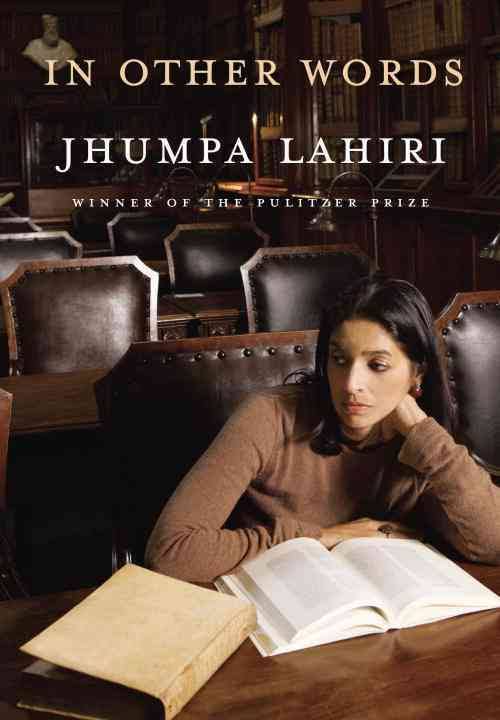By JOSEPH LUZZI
IN OTHER WORDS By Jhumpa Lahiri
Translated by: Ann Goldstein
233 pp. Alfred A. Knopf. $26.95.
Nothing reminds you how far you are from home more than trying to speak in someone elses tongue. As Jhumpa Lahiri writes in her gorgeous new memoir, In Other Words, a language is as vast as an ocean; the most a foreigner can ever hope to make of it is the size of a lake. She describes her written Italian as a piece of unsalted bread, correct but lacking the usual flavor. No student of Italian literature can hear these words and fail to think of Dantes famous passage on his exile in Paradiso, where he writes that he would come to learn how salty is the bread of others after his expulsion from Florence.

The image is both metaphorical and literal, for Florentines have made their bread without salt since the Middle Ages the heartbreaking separation from everyone and everything he loves, Dantes line suggests, will be so visceral he can taste it.
It is fitting that a nation with no unifying language for centuries should inspire a writer of Lahiris stature to organize her reflections around the concept of exile. What does it mean, she wonders, to give up a palace to live practically on the street, in a shelter so fragile? Why abandon the English language that made her famous and move with her family to Rome, as though quixotically hoping to swim across a linguistic ocean? Because she was in love:
When youre in love, you want to live forever. You want the emotion, the excitement you feel to last. Reading in Italian arouses a similar feeling in me. I dont want to die, because my death would mean the end of my discovery of the language. Because every day there will be a new word to learn. Thus true love can represent eternity.
The exuberant tone may surprise readers used to the understatement and quiet grace of Lahiris acclaimed novels and short stories. And rightly so, because In Other Words presents the same author with a different voice. The English we read is not hers, but belongs to her translator, Ann Goldstein, who has garnered well-deserved praise for her translations of Elena Ferrantes recent Neapolitan novels. Lahiri wrote In Other Words in Italian, refusing wisely, I think to translate her own work because she wished to maintain the discipline that has enabled her to write exclusively in Italian the past few years.
As her immersion in Italian deepens, Lahiri fears losing her moorings with literary English and wonders whether her infatuation with Italian will be considered a “dead end or, at best, a ‘pleasant distraction.’ ” But her move to Italy was a long time coming. The new language freed her from what she describes as the clash between the Bengali of her Indian parents and the English she learned after her family immigrated to the United States and her childhood home in Rhode Island. The more she mastered English, the further it took her from her ethnic origins and yet she fell in love with English as she would Italian, eventually becoming a writer vaulted into instant celebrity when her first collection of stories, Interpreter of Maladies (1999), won the Pulitzer. With the sudden fame, Lahiri writes, came the loss of the precious gift that writing had always brought her: a sense of invisibility, inaccessibility as Virginia Woolf might have put it, a room of her own.
Italy offered Lahiri more than solitude; it also gave her a new expressive vein. Reading Lahiri in English, the overriding sensation is one of restraint. In her most recent novel, The Lowland (2013), after an Indian graduate student, Subhash, loses his virginity to a woman named Holly, he opens the door of her cottage to find that the tide was in. The sky was bright, the ocean calm. All signs of the previous nights storm and the previous nights lovemaking have been erased, in a passage as controlled as the regulating tides.
In Other Words offers a necessarily messier, more open-ended register, as Lahiri gives us the most unusual of self-portraits, written as an adult, but also, from the linguistic point of view, as a child. Its a bit surreal reading the Italian autobiography of an American author translated by someone elses hand on the facing page. But the bilingual format is appropriate: All the personal experiences are connected to linguistic ones, all the linguistic issues refracted through the authors life.
In Other Words ends at a crossroads, with Lahiri set to leave Rome and return to America, not knowing what will come of her affair with Italian or her marriage with English, unsure of which language she will continue to write in. You will leave behind everything you love / most dearly, and this is the arrow / the bow of exile first lets fly” — Dante wrote these words some 700 years ago, but they seem especially relevant when speaking about “In Other Words,” a book that is everywhere about displacement and the discoveries it can lead to. Lahiri reached out to Italian when English stopped offering her the solitude she craved as a writer; now that she has left Italy we must wait to see where the arrow of exile points her.
The limits of my language mean the limits of my world, Wittgenstein once wrote reading In Other Words, one suspects Jhumpa Lahiri would agree. (New York Times)
Joseph Luzzi teaches at Bard and is the author of In a Dark Wood: What Dante Taught Me About Grief, Healing and the Mysteries of Love and My Two Italies.


Comments are closed.